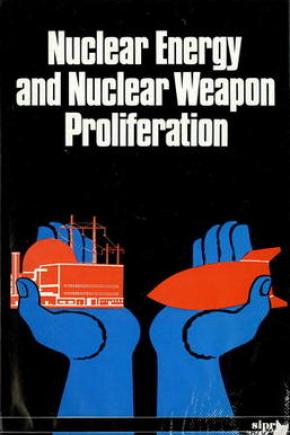Nuclear Energy and Nuclear Weapon Proliferation

In mid-1980 a second conference for the review of the Non-Proliferation Treaty (NPT) will take place in Geneva. Given the importance of preventing, or at least slowing down, nuclear weapon proliferation, this conference will be a crucial event in the field of arms control and disarmament. For many countries the technical and economic barriers to proliferation have disappeared, and the only remaining barriers are political.
In an attempt to contribute to the discussions at the NPT Review Conference, SIPRI assembled a group of experts from a number of countries to discuss the technical aspects of the control of fissionable materials in non-military applications. The meeting took place in Stockholm, 12–16 October 1978. This book on nuclear energy and nuclear weapon proliferation contains the papers presented at the symposium and reflects the discussions at the meeting.
PART I. INTRODUCTION
B. Jasani
Chapter 1. Fuel cycles
1. An evolutionary strategy for nuclear power
F. von Hippel, H. A. Feiveson and R. H. Williams
Appendix 1. Assumptions used in the economic calculations
Chapter 2. Enrichment
2. Practical suggestions for the improvement of proliferation resistance within the enriched uranium fuel cycle
J. H. Coates and B. Barré
3. Jet nozzle and vortex tube enrichment technologies
P. Boskma
4. Laser separation isotopes
K. L. Kompa
Chapter 3. Reprocessing
5. Proliferation risks associated with different back-end fuel cycles for light water reactors
K. Hannerz and F. Segerberg
Chapter 4. Waste disposal
6. Reprocessing and waste management
D. Abrahamson
Chapter 5. Physical barriers to proliferation
7. Can plutonium be made weapon-proof? B. T. Feld
PART II. INTRODUCTION
B. Jasani
Chapter 6. Breeders
8. The proliferation aspects of breeder deployment
B. Barré
9. The role of the breeder reactor
R. Garwin
Chapter 7. Hybrid reactors
10. Fusion-fission hybrid reactors
V. Kuhleshov
11. Laser fusion and fusion hybrid breeders: Proliferation implications
D. Westervelt and R. Pollock
PART III. INTRODUCTION
J. Goldblat
Chapter 8. Safeguards technology
12. IAEA safeguards technology
A. von Baeckmann
13. Safeguards techniques
W. A. Higinbotham
Chapter 9. Exporting policies
14. Applications of US non-proliferation legislation for technical aspects of the control of fissionable materials in non-military applications
W. H. Donnelly
Appendix 14A. Improving the reliability of the United States as a nuclear supplier: provisions of the Nuclear Non-Proliferation Act of 1978
Appendix 14B. International assurances of reliable nuclear supplies in the Nuclear Non-Proliferation Act of 1978
Appendix 14C. Desired conditions for international nuclear trade specified in Section 403 of the Nuclear Non-Proliferation Act of 1978
Appendix 14D. Desired limitations upon domestic use of nuclear power specified in Section 403 of the Nuclear Non-Proliferation Act of 1978
Appendix 14E. List of actions triggering cut-off of US nuclear exports specified in the Nuclear Non-Proliferation Act of 1978
Appendix 14F. Conditions for US agreements for nuclear cooperation required by the Nuclear Non-Proliferation Act of 1978
Appendix 14G. List of statutory criteria for approval of US nuclear exports
Appendix 14H. Notable procedural requirements for negotiation and renegotiation of agreements for nuclear cooperation
Appendix 14I. Notable requirements for NRC licensing of US nuclear exports
Appendix 14J. Notable procedural requirements for Department of Energy action on subsequent arrangements
Appendix 14K. Summary of provisions in the Nuclear Non-Proliferation Act of 1978 relating to sanctions against certain proliferation actions
Appendix 14L. Summary of notable implications of the Nuclear Non-Proliferation Act of 1978 for control of certain technological activities in the non-military applications of nuclear energy
Appendix 14M. Summary of provisions of the Nuclear Non-Proliferation Act of 1978 relating to enrichment of uranium
Appendix 14N. Summary of provisions of the Nuclear Non-Proliferation Act of 1978 relating to reprocessing of nuclear fuels
Appendix 14O. Summary of provisions of the Nuclear Non-Proliferation Act of 1978 relating to nuclear explosives
Appendix 14P. Summary of provisions of the Nuclear Non-Proliferation Act of 1978 relating to safeguards technology
15. Nuclear exporting policies
B. Sanders
Chapter 10. Multinational and international controls
16. A nuclear fuel supply cooperative: A way out of the non-proliferation débacle
A. R. W. Wilson
17. A preliminary evaluation of the technical aspects of INFCE
U. Farinelli
18. Nuclear proliferation: Arrangements for international control
J. Rotblat
PART IV. INTRODUCTION
B. Jasani
Chapter 11. Peaceful nuclear explosions
19. Peaceful applications of nuclear explosions
D. Davies
20. Technical aspects of peaceful nuclear explosions relevant to their possible role in the future proliferation of weapon-usable nuclear materials
A. R. W. Wilson
Chapter 12. Reactors in satellites
21. Nuclear reactors in satellites D. Paul
PART V
Chapter 13. Implementation of the Non-Proliferation Treaty
J. Goldblat
Appendix A. Treaty on the Non-Proliferation of Nuclear Weapons
Appendix B. Final Declaration of the Review Conference of the parties to the Treaty on the Non-Proliferation of Nuclear Weapons, 30 May 1975
Appendix C. List of states which have signed, ratified, acceded or succeeded to the Treaty on the Non-Proliferation of Nuclear Weapons (NPT) as of March 1979
Chapter 14. Nuclear energy and nuclear weapon proliferation
J. Rotblat

